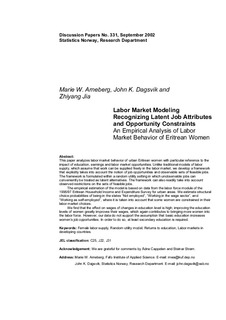| dc.description.abstract | Abstract:
This paper analyzes labor market behavior of urban Eritrean women with particular reference to the
impact of education, earnings and labor market opportunities. Unlike traditional models of labor
supply, which assume that work can be supplied freely in the labor market, we develop a framework
that explicitly takes into account the notion of job opportunities and observable sets of feasible jobs.
The framework is formulated within a random utility setting in which unobservable jobs can
conveniently be treated as latent alternatives. The framework can also readily take into account
observed restrictions on the sets of feasible jobs.
The empirical estimation of the model is based on data from the labor force module of the
1996/97 Eritrean Household Income and Expenditure Survey for urban areas. We estimate structural
choice probabilities of being in the states “Not employed”, “Working in the wage sector”, and
“Working as self-employed”, where it is taken into account that some women are constrained in their
labor market choices.
We find that the effect on wages of changes in education level is high; improving the education
levels of women greatly improves their wages, which again contributes to bringing more women into
the labor force. However, our data do not support the assumption that basic education increases
women’s job opportunities. In order to do so, at least secondary education is required. Keywords: Female labor supply, Random utility model, Returns to education, Labor markets in
developing countries. | en_US |
